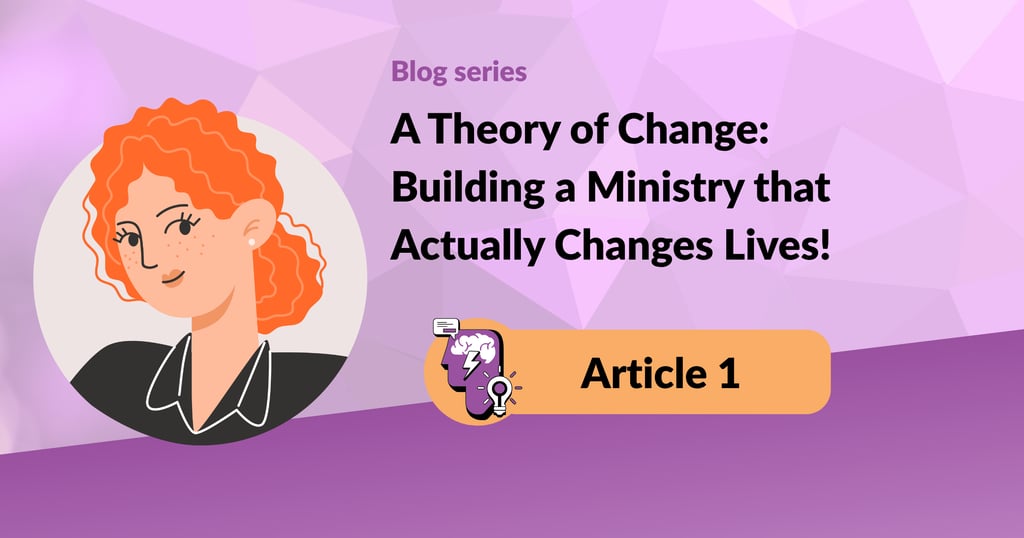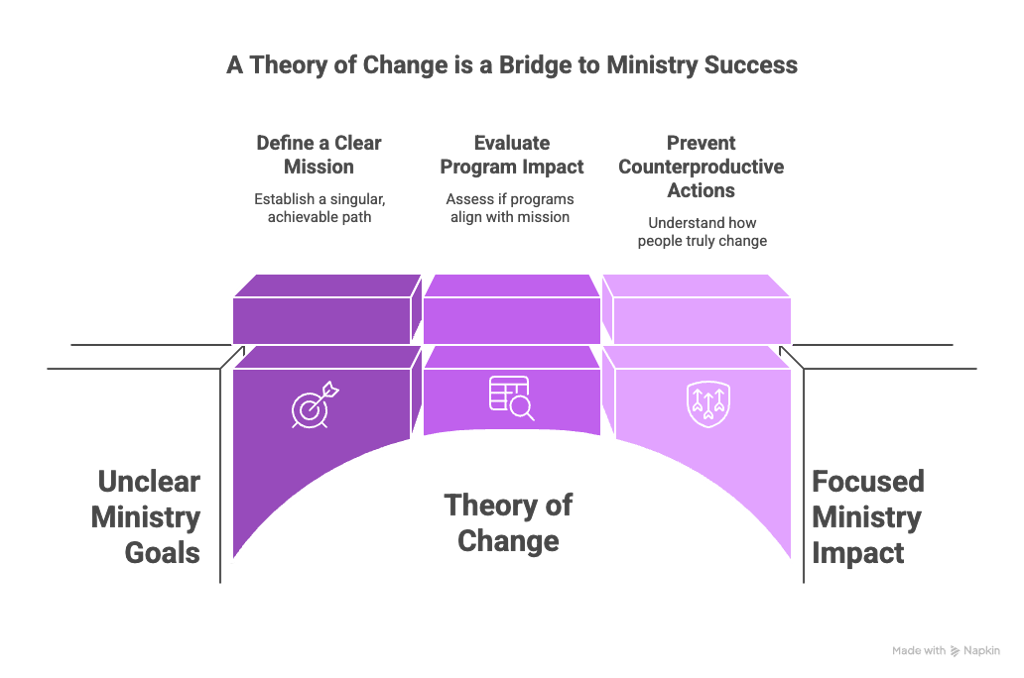1. Theory of Change: The One Thing Every Life-Changing Ministry Gets Right
Brandon Booth
6/2/20254 min read
Never miss a post! Signup for my email updates today and get expert guidance delivered directly to your inbox!
What separates ministries that consistently transform lives from those that struggle despite equal passion and dedication? There's a discoverable pattern among the most effective ministries—and it's simpler than you might think. There’s one thing that makes all the difference...
But first, welcome to the first article in my series A Theory of Change: Building a Ministry that Actually Changes Lives! Over the next several days I’ll be unpacking exactly what a Theory of Change is, how to develop a theory of heart change which is the core of every Christian ministry, and how to practically draft and implement a Theory of Change for your specific ministry.
The One Thing
Life-changing ministries have a clear, intentional theory of how people actually change.
Most ministries focus on what they do—their activities, events, and services. They talk about their programs, their outreach efforts, their community partnerships. But great ministries focus somewhere else entirely: the mechanics of transformation itself. In other words, they have a solid "Theory of Change."
The phrase comes from the strategic planning world, and I've found it uniquely powerful when applied to Christian ministry. And I'm particularly grateful to theologian Simeon Zahl, whose insights on heart change have shaped my thinking here.
Despite the name, a Theory of Change isn't just an abstract "theory." It’s not just a thought experiment. It's a clearly written document that guides your choices wisely. It visually maps out exactly how your activities connect to your mission and ultimate goals. It answers the fundamental question: "How does what we do actually create the change we're hoping to see?"
Think of it as your ministry's GPS. Without it, you might eventually reach your destination, but you'll take wrong turns, waste time on dead-end roads, and burn through resources unnecessarily. With it, every decision becomes clearer because you understand exactly how each step moves you toward your goal.
This isn't about having the "right" activities—it's about understanding what makes ministries effective and having clarity about how to spend your time and resources. Some of the most impactful ministries I know have very simple programs. What makes them effective isn't complexity; it's clarity about how change actually happens.
Why A Theory of Change Matters
A clear Theory of Change solves three critical problems:
First, it eliminates vague mission statements that aren't actually achievable. I've seen countless ministry mission statements that sound inspiring but offer no clear, singular path forward. "Transform our community through God's love" sounds wonderful, but how exactly does that happen? Or “We exist to build up youth, offer a safe and fun environment, and reach our community for Christ” sounds good, but it’s far too broad. Where will you spend your limited resources? Why? If you can't clearly describe how everything your ministry does plays a role in accomplishing your clear mission, then you need a Theory of Change.
Second, it stops the "spaghetti at the wall" approach. Do you feel like you keep trying new things but aren't sure if they're "working"? This is incredibly common. Without a clear theory of how change happens, ministry leaders often jump from program to program, hoping something will stick. You end up spending precious time and resources on activities without knowing if they actually accomplish your mission. A Theory of Change gives you criteria for making these decisions confidently.
Third, it prevents counterproductive activities. This might be the most important point. Without a Theory of Change—especially a theory of heart change (which we’ll unpack in later articles in this series)—you may unknowingly do things that work against your mission. If you feel like many of your activities are "missing the mark" but can't articulate why, you need a Theory of Change.
I've seen ministries accidentally undermine their own goals because they didn't understand how people actually change. They used approaches that seemed logical but were actually counterproductive to the transformation they hoped to create.


Your Next Step
Here's the opportunity: When you understand how change actually happens, everything else becomes clearer. Decisions that once felt overwhelming become straightforward. You stop second-guessing yourself and start moving forward with confidence.
Take a moment to honestly assess where you are:
Can you clearly explain how each of your ministry's main activities directly contributes to your mission? If someone asked you to draw a clear connection from your daily and weekly programs and activities to your mission statement, could you do it confidently?
What filter do you use to decide what new programs to implement? How often do you feel unable to make those choices? When opportunities arise or people suggest new initiatives, do you have clear criteria for saying yes or no?
If these questions make you uncomfortable, you're not alone. Most ministry leaders I work with initially struggle to answer them clearly. But here's the encouraging news: once you develop your Theory of Change, these decisions become much easier.
What's Next
Understanding that you need a Theory of Change is just the first step. But there's a hidden foundation beneath this success that most ministry leaders never think about—something that determines whether your theory will actually work in the real world.
In the next article, I'll show you exactly how to develop this foundation for your ministry—and why it's the key to lasting heart transformation and therefore to the success of your ministry.
Want to explore how this applies to your specific ministry? I'd love to help you think through your unique situation. Every ministry is different, and developing a clear Theory of Change requires understanding your particular context, calling, and community. Schedule a free 30-minute conversation with me, and let's discuss how you can bring this clarity to your ministry's work.
-------------------
This is the first article in our series A Theory of Change: Building a Ministry that Actually Changes Lives! Check out the next article here —>


Let's build!
Connect with me today and let's start building your ministry that will change lives!
© Brandon Booth, 2025
Expert guidance for nonprofits and ministries.
Brandon Booth



